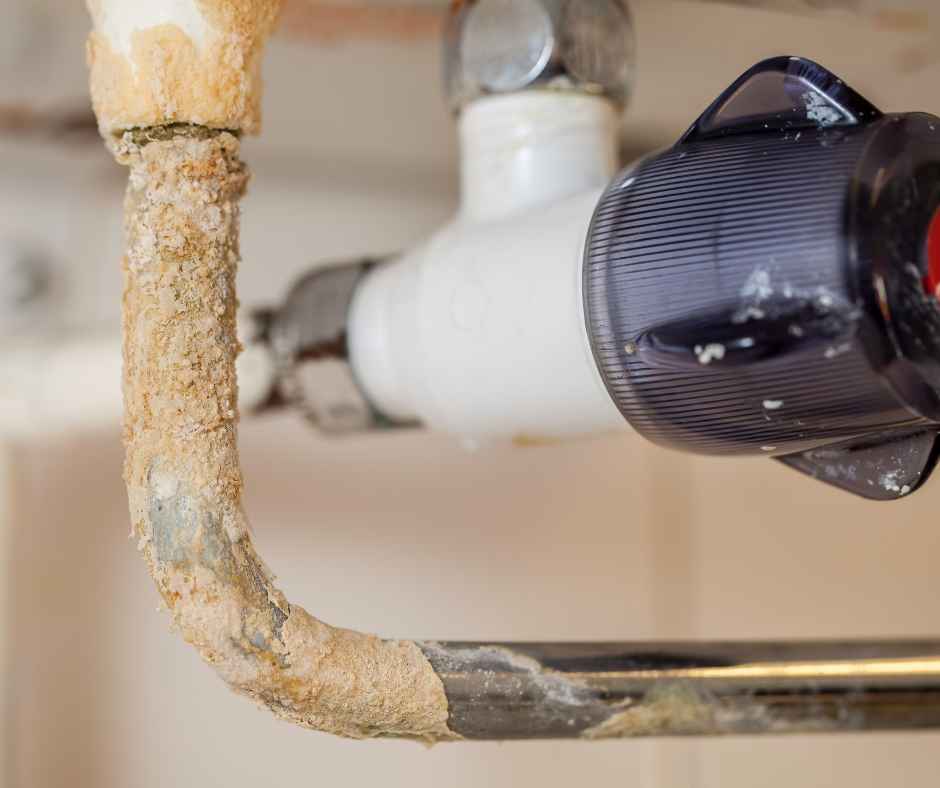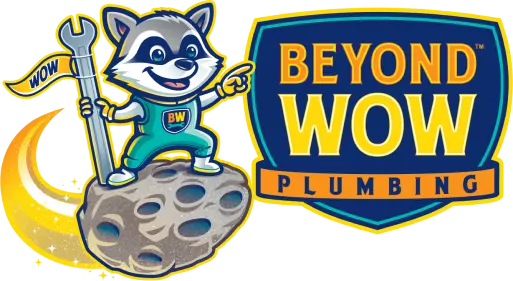
Hard Water in Austin: Why It Matters & How to Fix It
If you live in Austin, you have probably noticed cloudy glassware, dry skin, or stubborn buildup around faucets. These are all signs of hard water, a common issue in Central Texas caused by high levels of calcium and magnesium in the water supply.
While hard water is safe to drink, it can take a toll on your plumbing, appliances, and even your comfort. Over time, mineral deposits can clog pipes, damage water heaters, and make cleaning more difficult.
In this blog, we will explain what hard water is, how it affects Austin homes, and the best ways to fix it. With help from Beyond Wow Plumbing, you can protect your plumbing system, improve water quality, and enjoy a cleaner, more efficient home.
What Is Hard Water?
Hard water is water that contains a high concentration of dissolved minerals, primarily calcium and magnesium. These minerals naturally enter the water supply as it moves through limestone and chalk deposits underground.
In Austin, hard water is a well-known issue due to the region’s geological makeup. Most homes in the area have water hardness levels ranging between 180 and 300 parts per million (ppm), which is considered very hard.
While these minerals are not harmful to your health, they can cause problems for your home’s plumbing system and appliances. Over time, calcium and magnesium buildup forms limescale, a chalky residue that clings to pipes, faucets, and fixtures. This buildup restricts water flow and reduces the efficiency of your plumbing system.
How to Tell If You Have Hard Water
Many homeowners in Austin have hard water without realizing it. The signs are often visible in everyday household routines. Recognizing these clues early can help you prevent long-term plumbing damage.
Look for these common signs of hard water in your home:
- White or chalky spots on dishes and glassware, even after washing
- Soap scum on sinks, tubs, or shower doors that is difficult to remove
- Dry skin and dull hair after bathing or showering
- Reduced water pressure from mineral buildup in faucets and showerheads
- Shortened lifespan of appliances such as water heaters or dishwashers
You can confirm hard water by using a home water test kit or scheduling a professional water quality test. These tests measure the mineral content in your water and help determine if a water softener or other treatment system is needed.
If you notice any of these signs, it is likely your Austin home has hard water that should be addressed before it causes more serious problems.
Why Hard Water Matters
Hard water might seem like a small inconvenience, but over time, it can lead to serious and costly issues. The minerals in Austin’s hard water gradually build up inside your plumbing system, appliances, and fixtures. This buildup reduces efficiency, increases maintenance needs, and shortens the lifespan of your equipment.
Here is how hard water affects your home:
- Plumbing damage: Mineral deposits form inside pipes, restricting water flow and increasing pressure. This can eventually lead to leaks or pipe corrosion.
- Appliance wear: Water heaters, dishwashers, and washing machines work harder when coated with limescale, which raises energy costs and reduces efficiency.
- Cleaning challenges: Hard water reacts with soap, leaving behind residue that makes surfaces appear dull or dirty.
- Personal discomfort: Many homeowners notice dry skin, brittle hair, and dull laundry caused by mineral buildup in water.
Ignoring hard water does not just impact comfort; it also affects your plumbing system’s long-term health. Treating it early protects your home and saves money on future repairs.
How Hard Water Affects Your Plumbing System
Hard water is one of the most common causes of plumbing issues in Austin homes. The minerals in hard water collect inside your pipes and fixtures, forming a thick, chalky layer known as limescale. Over time, this buildup reduces water flow and forces your system to work harder.
Limescale does not just affect pipes. It also damages key components such as:
- Water heaters: Mineral buildup on heating elements causes the system to overheat and use more energy.
- Faucets and showerheads: Clogged openings reduce pressure and create uneven water flow.
- Appliances: Dishwashers, washing machines, and ice makers develop residue that shortens their lifespan.
This buildup can also lead to corrosion, leaks, and higher utility bills. In severe cases, it can cause permanent damage to your plumbing system.
The good news is that proper water treatment can prevent limescale from forming. By addressing hard water early, you can protect your home’s pipes and keep your plumbing system running efficiently for years.
Water Softeners: The Most Effective Solution
The most reliable way to solve hard water problems in Austin is by installing a water softener system. Water softeners remove the minerals that cause hardness, protecting your plumbing and improving your home’s water quality.
A water softener works through a process called ion exchange. As hard water passes through the softener tank, calcium and magnesium ions are replaced with sodium or potassium ions. This process eliminates the minerals responsible for buildup and leaves your water softer and cleaner.
The benefits of a water softener include:
- Longer-lasting plumbing and appliances
- Improved water pressure due to reduced mineral buildup
- Cleaner dishes, laundry, and fixtures
- Softer skin and hair after bathing
- Lower energy bills from more efficient water heating
Professional installation ensures that the softener is properly sized for your home’s water usage and hardness level. Regular maintenance, such as refilling salt and checking resin beads, keeps the system running smoothly.
With a water softener, homeowners can enjoy better comfort, reduced maintenance, and lasting protection for their plumbing systems.
Alternative Water Treatment Options
While traditional water softeners are the most effective solution for hard water, there are a few alternatives that can also improve water quality. These options can be useful for homeowners who prefer low-maintenance or salt-free systems.
Here are some common alternatives:
- Water conditioners: These systems do not remove minerals but change their structure so they do not stick to pipes or fixtures. They are easier to maintain and do not require salt.
- Whole-home filtration systems: These filters remove impurities such as chlorine, sediment, and heavy metals while improving taste and odor. Some models can reduce hardness slightly but not completely.
- Reverse osmosis systems: Ideal for drinking water, these units use a membrane to filter out minerals and contaminants for cleaner, better-tasting water.
Each option offers different benefits depending on your household needs. A professional plumber can help you decide which system works best based on your water hardness levels and budget.
For many Austin homes, a combination of softening and filtration provides the best balance of protection and quality.
Why Professional Installation Makes a Difference
Installing a water softener or filtration system may look simple, but professional installation ensures your system performs at its best. Correct setup, sizing, and calibration are essential for achieving consistent water quality and protecting your plumbing system.
A professional plumber will:
- Test your water hardness to determine the right system size and type
- Connect the system properly to ensure even water flow and prevent leaks
- Calibrate settings so the unit regenerates efficiently and uses the right amount of salt or water
- Inspect plumbing connections to confirm compatibility with existing pipes and fixtures
DIY installations often result in leaks, low efficiency, or early system failure. Working with an experienced plumber guarantees your investment is protected and your home receives the best water quality possible.
Beyond Wow Plumbing provides expert water softener installation and maintenance for Austin homeowners. Our team ensures every system is set up correctly, giving you lasting results and softer water you can rely on.
Enjoy Softer Water and a Stronger Plumbing System
Hard water is one of the most common plumbing issues in Austin, but it is also one of the easiest to fix. Addressing mineral buildup early can protect your pipes, improve your appliances, and make your water feel better for everyday use.
Whether you choose a water softener, filtration system, or a combination of both, treating hard water is an investment in your home’s long-term efficiency and comfort. With professional guidance, you can enjoy cleaner, softer water and reduce costly plumbing repairs in the future.
If you are ready to improve your home’s water quality, contact Beyond Wow Plumbing today. Our Austin Plumbers can test your water, recommend the right solution, and install a system designed to keep your home running smoothly for years to come.
Frequently Asked Questions About Hard Water in Austin
Is hard water common in Austin?
Yes. Austin’s water supply naturally contains high levels of calcium and magnesium, making it some of the hardest water in Texas. Most homes benefit from using a water softener or filtration system to reduce mineral buildup.
Can hard water damage my plumbing?
Over time, minerals in hard water can build up inside pipes and fixtures, causing reduced water pressure, corrosion, and leaks. Installing a water softener helps protect your plumbing system from these problems.
What is the best way to test my home’s water hardness?
You can purchase an inexpensive test kit from a hardware store or schedule a professional water quality test with Beyond Wow Plumbing. A professional test gives more accurate results and helps determine the right treatment system for your home.
Do water softeners remove all minerals from the water?
Water softeners remove calcium and magnesium, which cause hardness, but they do not remove all minerals or contaminants. For the cleanest water, many homeowners combine softening with a whole-home filtration system.
How often should a water softener be serviced?
Most systems need maintenance once a year, including checking salt levels, cleaning the brine tank, and inspecting resin beads. Regular service from a licensed plumber ensures your softener continues to run efficiently.
Ready for Out-of-This-World Plumbing Service?




